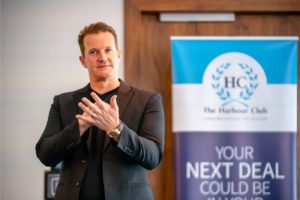I love sharing stories of great deals, especially when the deals show that the tactics we share at the Harbour Club work. This is a remarkable story of “Steve,” a Harbour Club member since August 2017, and a deal that presented itself literally a few days after he attended his first-course meeting. The lead: a company insurance inquiry that came into his independent financial advice (IFA) firm.
Here’s Steve’s story:
Steve noticed that the company owner was seventy-two, that the company had a strong balance sheet, and made an average profit of $200,000 per year. The elderly owner wanted to retire and spend time with his second wife, who was twenty-seven years younger than he was. He hadn’t spent much time with his first wife because he was running the business, and after she died, he realized the importance of family time. He had no other offers on the table, although his accountant had been trying to sell the company for him. Steve was considered an experienced person to be trusted to safeguard his legacy and his staff.
Steve got on well with the owner. They respected each other. Steve commented, “We could have got a deal done over a glass of wine and drafted our own contracts.”
That would have been the right way to do it. As soon as the lawyers got involved, the whole thing slowed down and almost died.
The business highlights were:
- a long-established niche market with good repeat business
- $200,000 annual profit
- cash in the bank
- a debt-free property worth $1 million that was partly subleased to another company providing a nice additional income stream
- no debt
The company occupied a small industrial site. The whole site was his factory plus another part of the industrial site that was sublet to somebody else. The total official evaluation came up with around $1 million for the real estate.
Steve presented various strategies from the “deal pie” to the owner with a pretty healthy $1.7 million headline number. However, none of it came from Steve. While the seller felt this was a great solution to getting him out and free (the real motivation), there were two roadblocks to the deal. First, the accountant claimed that, “If Steve is not putting any cash in, we can get a better deal.” Steve pointed out the accountant had been trying to sell it already and had not been able to, so why would he suddenly be able to do better? The second roadblock was the family for the same reason. There was only one shareholder, but there seemed to be multiple decision-makers, or at least influencers, so Steve had to then build rapport with the family as well to show he was to be trusted. He invited the family to his home, and that personal meeting clinched the deal.

The deal amounted to $1.7 million, made up of a $450,000 initial payment (paid from the company’s own money) and the balance deferred at $200,000 a year for six years. Steve didn’t have to part with any of his own cash. He learned a lot from the negotiation, especially noting how crucial the head of terms (or letter of intent) meeting was, because, without it, the deal would have fallen apart.
Being patient is truly a virtue, because doing a deal can be a bumpy road at times. Steve says, “Avoid lawyers if you can; if not, make sure both sides are on a fixed fee. I would even go as far as to pay for both sides’ legal fees if it gets the deal done quicker.” Steve’s lawyer worked on a fixed fee totaling $8,844; the other side spent $39,860 on lawyers’ fees. The legal team for the seller was not on a fixed fee, so they were motivated to drag the deal out and earn a small fortune in the process.
Deal Fatigue
The seller’s lawyers did a great job of dragging the deal out. Part of the legal noise that cropped up was the fact that Steve was going to be paying the seller money over the next six years. Steve was taking on a bank loan and taking some money out of the business’ bank account. The seller’s lawyer was worried that, if Steve didn’t pay the bank loan, then the bank would pull the rug out from underneath them and take all the real estate, leaving no security for the five years’ worth of deferred payments.
Steve’s solution was simply to extend the payout period. So, instead of it being six years, he stretched it out to seven years. If Steve had made that offer originally, he probably wouldn’t have gotten as far as the LOI meeting and possibly not even as far as having a handshake on the deal. But, at the eleventh hour, deal fatigue had set in. Everybody was at the point of giving up and beginning to think, “Whatever it takes, let’s just get this thing over the line.”

Originally, Steve wanted to use a traditional lender for a property loan to release cash into the deal, but they were horrendous to deal with, so he quickly dropped them in favor of a longer, deferred payment plan. This also meant leaving the assets unencumbered (no mortgage), which made the seller more comfortable and, with no bank in the deal, there were fewer fees and less legal involvement. Steve plans to avoid property lending at the beginning of a deal in the future, maybe introducing it as part of a deferred payment or a refinance once in control.
Steve implemented the Harbour Club turnaround strategies. The business was not distressed, but obviously, if you apply these strategies to a good business, they make it even better. He took the $200,000 annual profit to a run rate of $350,000 per year and was able to extract some previously unexploited research and development tax claims, with over $30,000 already received and another $150,000 in process—some nice quick wins.
Based on his success, Steve is now actively looking to bolt on another company in the industrial or engineering sector to get a bit more scale, and then possibly look at an agglomeration in the sector because it is highly fragmented; there are many small players without much idea around succession. It would be ideally suited for a collaborative roll-up strategy.
Steve owns an IFA firm, and through its clients, he has sourced two good deals so far.
Using another tactic Steve learned in the Harbour Club course, he has accelerated the process of selling the IFA business and will now get quite a significant price premium, giving him another extra $1 million from the deal versus a normal exit. Steve said, “I am adding a minimum of $1 million extra to my net worth from the deal. It still blows my mind that within a year of doing the Harbour Club course, I am going to make an extra $1 million!”
These deals do take time, but when you follow the tactics I’ve been outlining here in this blog series, as well as what we teach at the Harbour Club, you learn a lot, you earn a lot, and you gain a lot.
Next time, I’m going to share a little bit about mergers! One of my favorite subjects! Be sure to come back and check it out!
Let’s Connect!
HarbourClubUSA.com
Unity-Group.com



